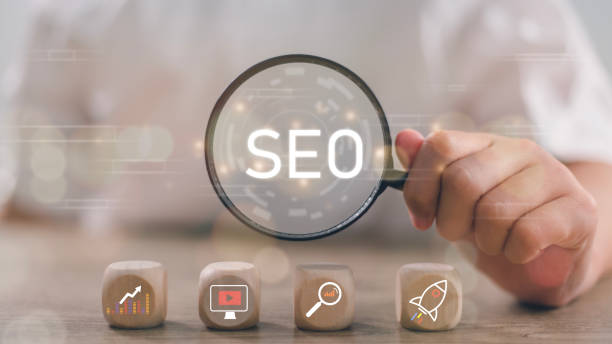What is Off-Page SEO and Why is it Crucial for Your Business?

Off-page SEO, or off-site search engine optimization, refers to a set of activities performed outside your website with the aim of improving your website’s ranking in search results.
These activities primarily focus on #domain_authority and #increasing_authority of the website.
While #on_page_seo deals with optimizing content and internal site structure, #off_page_seo focuses on signals that indicate the trust and popularity of a site from the perspective of other sites and users.
The core of off-page SEO is link building, or acquiring backlinks from other reputable websites.
Each backlink acts as a vote of confidence from another website to your content.
The greater the number and quality of these backlinks, the more Google recognizes your website as authoritative and a reference, and consequently, assigns it a higher rank.
In addition to backlinks, other factors such as brand mentions on other websites, social signals, and even user comments in forums and communities also play a role in off-page SEO.
These factors indirectly show search engines that your website is a valuable and trustworthy resource for users.
For any business looking to increase visibility and organic traffic, understanding and implementing off-page SEO strategies is vital.
Without strong off-page SEO, even if your internal content is exceptional, you may not be able to achieve top rankings.
This issue becomes doubly important, especially in competitive markets, as competitors are also striving to gain off-site authority.
For this reason, precise and continuous planning for strengthening off-page SEO is a necessity, not an option.
Is your e-commerce site ready to attract maximum customers and increase sales? Rasaweb transforms your online business with modern and efficient e-commerce website design.
✅ Increased speed and improved SEO
✅ Excellent user experience on mobile and desktop⚡ Get a free e-commerce website design consultation from Rasaweb!
The Importance of Backlinks and Their Role in Ranking Improvement

Backlinks form the backbone of off-page SEO and have long been one of Google’s most important ranking factors.
But why are they so important? Understanding this helps us formulate better strategies to acquire them.
Google and other search engines consider backlinks as “votes of confidence” or “references” from one website to another.
The greater the number and quality of these references, the more a website’s Authority increases in Google’s eyes.
Domain Authority and Page Authority are metrics introduced by SEO tools like Moz, which measure the strength of a domain or page based on various factors, including the number and quality of backlinks.
A quality backlink is one obtained from a reputable website, relevant to your field of work, and with high traffic.
For example, if a large and reputable technology news site links to your content about the latest SEO trends, this link is much more valuable than dozens of links from low-authority or irrelevant websites.
In addition to the quality of the source site, anchor text is also very important.
Anchor text is the text on which the link is placed and helps users and search engines understand the topic of the destination page.
Using diverse anchor texts relevant to target keywords can greatly help your off-page SEO.
However, it should be noted that excessive use of exact match keyword anchor texts can lead to a Google penalty.
Diversity in the backlink profile is also important.
This means that your backlinks should not come from only one type of source.
A combination of guest article links, directories, forums, and news sources can create a natural and strong backlink profile.
Finally, it should be remembered that acquiring backlinks is a time-consuming process that requires persistence.
An off-page SEO strategy should be based on acquiring high-quality and natural links, not artificial and spammy links.
Types of Backlinks and Effective Link Building Strategies

Link building is one of the most challenging yet important aspects of off-page SEO.
To have a successful link-building strategy, it is necessary to be familiar with the types of backlinks and methods of acquiring them.
Generally, backlinks are divided into two main categories: Dofollow and Nofollow.
Dofollow links allow search engines to pass authority (link juice) to the destination page, while Nofollow links do not pass this authority.
However, Nofollow links can still drive traffic to your site and contribute to the diversity of your backlink profile.
White Hat link-building strategies, which are approved by Google, include creating valuable and shareable content, link building through guest blogging, broken link building, and Digital PR to gain media coverage and relevant links.
In guest blogging, you write a high-quality article for another website in a related field and, in return, receive a link back to your site.
This method not only helps your off-page SEO but also increases brand awareness and referral traffic.
In contrast, Black Hat link building includes methods such as buying links, using Private Blog Networks (PBNs), and automated link building, which Google identifies and penalizes.
These methods may yield short-term results but will harm your site’s reputation in the long run.
To avoid these risks, you should always focus on acquiring natural and high-quality links.
Another important aspect of a link-building strategy is analyzing competitor backlinks.
Using SEO tools, you can examine your competitors’ backlink profiles and identify their link-building sources.
This can give you new ideas for acquiring relevant and valuable links and help you strengthen your off-page SEO.
| Backlink Type | Description | Impact on SEO | Example |
|---|---|---|---|
| Dofollow | Transfers authority to the destination page | High | Guest article links, Public Relations |
| Nofollow | Does not directly transfer authority, but useful for traffic and diversity | Medium (Indirect) | Social media links, blog comments, sponsored links (usually) |
| UGC Links | User Generated Content | Medium (for identifying user-generated content) | Forum links, blog comments |
| Sponsored Links | Paid or promotional links | Dangerous (if not tagged correctly) | Banner ads, sponsored posts |
Brand Mentions and Social Signals; Hidden Factors of Off-Page SEO

In addition to backlinks, there are other factors in off-page SEO that may not be as obvious as link building but significantly impact your website’s credibility and ranking.
One of these important factors is “brand mention” or referring to your brand name on websites, news articles, blogs, or even podcasts without a direct link.
Google and other search engines are capable of identifying these unrelated mentions and consider them as an indication of a brand’s popularity and credibility.
The more your brand name is mentioned in reputable online spaces, the more Google recognizes your website as an authority in its field of activity.
This is particularly important for businesses looking to build brand authority and become a thought leader in their industry.
Digital Public Relations (Digital PR) plays a key role here.
By producing newsworthy content, organizing events, or providing valuable statistics and reports, you can attract the attention of media and bloggers to mention your brand name.
These mentions, even without links, can indirectly help your off-page SEO and increase direct traffic to your website.
Another factor is Social Signals.
Sharing your content on social networks like Twitter, LinkedIn, and Facebook, likes, comments, and the level of user engagement with your content, although not directly influencing Google’s ranking (because these signals are easily manipulable), can be very beneficial indirectly.
Increased social media sharing can lead to greater visibility of your content, increase traffic to your website, and boost the chances of your content being seen by bloggers and journalists, which ultimately helps in acquiring natural backlinks and strengthening off-page SEO.
Furthermore, continuous activity on social networks can help build a loyal and active community around your brand, which leads to the sustainability and growth of your business in the long run.
Still don’t have a corporate website and are missing out on online opportunities? Solve this problem forever with professional corporate website design by Rasaweb!
✅ Double your business credibility
✅ Attract new customers
⚡ Get a free consultation for your corporate website now!
How Engaging and Entertaining Content Helps Off-Page SEO?

In today’s world, simply producing educational and specialized content is not enough.
To stand out and gain a position in the competitive online space, your content must be able to capture users’ attention and encourage them to share and interact.
This is where the role of engaging and entertaining content in off-page SEO strategy becomes apparent.
Content that challenges users, sparks their curiosity, or simply makes them laugh and entertains them, has high potential to go viral.
When a piece of content goes viral, it is automatically shared on social networks, mentioned in blogs and news sites, and naturally leads to increased brand mentions and backlink acquisition.
For example, an attractive and interactive infographic about strange SEO statistics, a personality quiz related to your industry, a short and funny video about common business mistakes, or even a controversial case study showing unexpected results can attract a lot of attention.
The goal of producing such content is to make users feel like they need to share it with their friends and colleagues.
These widespread shares lead to increased visibility of your site, increased referral traffic, and ultimately increased chances of acquiring natural backlinks from other sites, all of which help strengthen your off-page SEO.
Producing engaging content can also lead to discussions about your brand.
When users talk about your content in forums, social media groups, or blog comment sections, this indicates to search engines that your content is worth discussing and paying attention to.
These discussions, even without direct links, still contribute to your brand’s credibility and indirectly affect off-page SEO ranking.
Ultimately, combining specialized and educational content with creative and entertaining content can be a comprehensive and very effective strategy for attracting an audience and improving your position in search engines.
This multifaceted approach strengthens the foundations of your content marketing and off-page SEO.
Advanced Off-Page SEO Strategies for Competing in Crowded Markets

In highly competitive markets, relying on basic off-page SEO strategies may not be enough to reach the top.
To surpass competitors, we need more advanced and creative approaches in the field of off-page SEO.
One such strategy is deep analysis of competitor backlinks.
Advanced SEO tools allow you to not only see the number of competitor backlinks but also examine their quality, type, and anchor texts.
By identifying powerful link-building sources of competitors, you can find new opportunities to acquire similar or even better links for your website.
This analysis should be done continuously to ensure you are always aware of your competitors’ latest link-building strategies.
Another strategy is the targeted use of Digital Public Relations (Digital PR).
Instead of just sending advertorials, look for creating newsworthy stories that are worth extensive media coverage.
This can include publishing original research, unique surveys, industry-specific data analysis, or even reacting to current and important events.
When reputable media outlets link to your content due to its news value, these links are considered very powerful and natural by Google and have a significant impact on your off-page SEO.
Also, focusing on link building from authoritative and less-discovered domains (Niche Edits) can be very effective.
This method involves finding relevant and high-quality content on reputable websites and then persuading the author or site administrator to add a link to your content within the existing text.
This requires strong communication skills and presenting a compelling value proposition, but the results can be extremely valuable.
Finally, don’t forget Local Off-Page SEO.
For local businesses, acquiring backlinks from local directories, local news sites, and local community organizations can be very important and help improve rankings in local search results.
These strategies require time, effort, and creativity, but ultimately help you gain a superior position in crowded markets.
Key Metrics for Measuring Success in Off-Page SEO Campaigns

Simply implementing off-page SEO strategies is not enough; to ensure the effectiveness of efforts, results must be continuously measured and analyzed.
Measuring success in off-page SEO allows us to identify the strengths and weaknesses of campaigns and optimize strategies based on data.
One of the most important metrics is Domain Authority and Page Authority, provided by tools like Moz and Ahrefs.
Increasing these metrics indicates an improvement in your website’s strength and authority over time.
Of course, these metrics are not directly used by search engines, but they are good indicators for tracking off-page SEO progress.
Another vital metric is Keyword Rankings.
The main goal of off-page SEO is to improve the site’s ranking for target keywords.
Monitoring changes in keyword rankings over different time periods shows whether your link-building and branding efforts have led to the desired results.
If rankings are improving, it’s a sign of success.
Otherwise, strategies need to be revised.
In addition to keyword rankings, Organic Traffic is also a very important indicator.
Increased traffic from search engines means more users are reaching your website through search, indicating better visibility of your site in search results.
Analyzing traffic sources in Google Analytics can show which channels (e.g., new referral links) have increased traffic.
Referral Traffic from backlinks is also another important metric.
Although the primary goal of backlinks is to transfer authority, high-quality links can also direct direct traffic to your site.
Tracking this traffic can demonstrate the practical value of acquired links.
Finally, metrics such as Conversion Rate and Return on Investment (ROI) should also be examined to determine the effectiveness of off-page SEO on your ultimate business goals.
This comprehensive analysis helps you optimize your strategies for maximum return.
| Metric | Importance | Tracking Tools | Key Point |
|---|---|---|---|
| Domain/Page Authority | Indicator of site strength and authority | Moz, Ahrefs, Semrush | Gradual increase indicates success. |
| Keyword Rankings | Site’s position in search results for keywords | Google Search Console, Semrush, Ahrefs | Focus on keywords with high search volume and reasonable competitiveness. |
| Organic Traffic | Number of visitors from organic search | Google Analytics, Google Search Console | Increasing organic traffic is the ultimate goal of SEO. |
| Referral Traffic | Incoming traffic from other sites (backlinks) | Google Analytics | Indicates the practical value of acquired links. |
| Brand Mentions | Number of times brand name is mentioned without a link | Google Alerts, Brand Monitoring Tools | Indicates increased brand awareness and authority. |
Common Off-Page SEO Mistakes and How to Avoid Them

On the path to strengthening off-page SEO, there are mistakes that can not only render your efforts fruitless but may also lead to severe penalties from Google.
Identifying and avoiding these mistakes is essential for a sustainable and successful SEO strategy.
One of the most common and dangerous mistakes is buying backlinks or participating in artificial link-building schemes.
Google severely cracks down on any attempts to manipulate ranking algorithms through the buying and selling of links.
This can lead to a manual penalty, which is very difficult to recover from and seriously harms your site’s reputation.
Always focus on acquiring natural, high-quality links through valuable content creation and relationship building.
Another mistake is excessive link building with exact match keyword anchor texts.
In the past, using anchor texts containing the main keyword was common, but with Google algorithm updates like Penguin, this practice is considered an attempt to manipulate rankings.
A natural backlink profile has a high diversity of anchor texts, including brand names, naked URLs, generic keywords, and partial match keywords.
Ignoring the quality of referring domains is also a common mistake.
Some SEOs, instead of focusing on quality, seek to increase the number of backlinks, even if these links come from spammy or irrelevant sites.
Links from low-authority, irrelevant, or even harmful domains can damage your site’s reputation.
Always look for links from reputable sites relevant to your field of activity.
Lack of regular monitoring of your backlink profile can also be dangerous.
Spam links generated by competitors or toxic links to your site can harm your site without your knowledge.
Using backlink monitoring tools and performing a Disavow file submission in Google Search Console to disavow harmful links is a crucial preventative measure.
Finally, impatience and not waiting for results is also a common mistake.
Off-page SEO is a long-term process, and its results do not appear quickly.
Having a consistent and sustainable strategy and continuous monitoring is the key to success in this area.
How much does losing business leads due to an unprofessional website cost you? Solve this problem forever with professional corporate website design by Rasaweb!
✅ Increase the credibility and trust of potential customers
✅ Easier attraction of new business leads
⚡ Get a free consultation now!
The Future of Off-Page SEO and Upcoming Changes

The world of SEO is constantly changing and evolving, and off-page SEO is no exception.
With advancements in technology and artificial intelligence, the future of off-page SEO is moving towards an even greater emphasis on quality, naturalness, and real user value.
In the future, Google and other search engines will become much smarter at identifying artificial and spammy link-building patterns.
Therefore, strategies based on creating excellent content and acquiring natural and viral backlinks will become even more important.
This means a greater focus on content marketing that naturally leads to sharing and organic references.
One of the important developments is the impact of Artificial Intelligence (AI) on Google’s algorithms.
Algorithms like BERT and RankBrain enable Google to better understand natural language and identify user intent.
This means that backlinks and mentions in content that are naturally and relevantly produced for user needs will gain more value.
Focusing on building relationships with influencers and reputable publishers, not just buying links, will become even more crucial for strengthening off-page SEO.
Also, the importance of brand signals and online reputation is increasing.
Google looks for websites that not only rank high for specific keywords but are also recognized as credible and trustworthy sources throughout their industry.
This includes the number of direct searches for your brand name, mentions of your brand in news media, and positive user reviews.
In fact, off-page SEO will move closer to Digital Public Relations and building a reputable brand than just link building.
In the future, successful SEOs will be those who, instead of focusing solely on technical metrics, focus on creating real value, building an audience, and increasing brand authority in the online space.
This comprehensive approach will ensure sustainability and long-term growth in the competitive world of SEO.
Conclusion and Next Steps for Strengthening Off-Page SEO

In this article, we comprehensively examined off-page SEO and its various dimensions.
We learned that off-page SEO is beyond mere link building and includes a set of activities to increase the credibility, popularity, and authority of a website in the eyes of search engines and users.
From the importance of quality backlinks to the role of social signals and brand mentions, each of these factors somehow helps improve your site’s position in search results.
In today’s competitive markets, strengthening off-page SEO is an indispensable element of any successful digital marketing strategy.
Without it, even with the best on-page content, achieving top rankings and high organic traffic will be difficult.
For success in off-page SEO, your approach should always be based on quality, naturalness, and sustainability.
Strictly avoid any spammy and black-hat activities that could lead to Google penalties.
Instead, focus on creating valuable content, building relationships with reputable websites and influencers, and increasing brand awareness in the online space.
Next steps for strengthening your off-page SEO include the following:
- Comprehensive analysis of current backlink profile: Use SEO tools to examine your existing backlinks, identify and disavow harmful links.
- Research and identification of link-building opportunities: Analyze your competitors and find reputable sites from which you can acquire backlinks.
- Creation of link-worthy content: Create high-quality, unique, and shareable content (such as infographics, original research, videos).
- Execution of white-hat link-building campaigns: Use methods such as guest blogging, broken link building, and Digital PR.
- Continuous monitoring and analysis of results: Regularly evaluate your progress using key metrics such as Domain Authority, keyword rankings, and organic traffic, and optimize strategies accordingly.
- Building brand authority: Help build a strong and reputable brand through social media activity, participation in online discussions, and excellent customer service.
By following these guidelines and adopting a strategic and long-term approach, you can significantly improve your website’s off-page SEO and achieve sustainable growth for your online business.
Frequently Asked Questions
| Row | Question | Answer |
|---|---|---|
| 1 | What is Off-Page SEO? | Off-page SEO refers to a set of actions performed outside your website to improve its ranking in search engines. These actions include backlink building, social media presence, branding, and so on. |
| 2 | Why is Off-Page SEO highly important? | Off-page SEO shows search engines that your website is credible, popular, and trustworthy. Quality backlinks from reputable sites are strong signals for better ranking and help increase your domain authority. |
| 3 | What are the most important components of Off-Page SEO? | The most important components of Off-Page SEO include: Link Building, Content Marketing, Social Media Marketing, Influencer Marketing, and Online Reputation Management. |
| 4 | What is a backlink and why is it important for Off-Page SEO? | A backlink is a link from another website that points to your website. These links act as a “vote of confidence” in Google’s view and indicate the credibility of your content. The more numerous and higher quality the backlinks, the better your site’s ranking will be. |
| 5 | What are the types of backlinks in terms of SEO impact? | The two main types of backlinks are DoFollow and NoFollow. DoFollow backlinks pass authority (Link Juice) and directly affect rankings. NoFollows do not pass authority but can still generate traffic and help make the link profile appear natural. (Also UGC and Sponsored) |
| 6 | How can quality backlinks be created for my website? | To build quality backlinks, methods such as: creating excellent and shareable content, Guest Posting on relevant and reputable sites, Broken Link Building, Digital PR, and analyzing competitor backlinks can be used. |
| 7 | What are Toxic Backlinks and how do they affect a website? | Toxic or spam backlinks are links that point to your site from low-quality, spammy, or irrelevant websites. These backlinks can harm your site’s ranking and even lead to penalties by Google’s algorithms. |
| 8 | What is the role of social networks in Off-Page SEO? | Although social signals (likes, shares, etc.) are not direct ranking factors, they help off-page SEO. They increase content visibility, drive direct traffic to the site, and ultimately increase the chance of acquiring natural backlinks and improving brand recognition. |
| 9 | What is the importance of diversity in a backlink profile? | Diversity in the backlink profile means that your links come from various sources (blogs, forums, news sites, directories), with diverse anchor texts, and a mix of DoFollow and NoFollow links. This diversity shows Google that your link-building is natural and organic. |
| 10 | What are common mistakes in Off-Page SEO that should be avoided? | Common mistakes include: buying backlinks in large volumes from low-quality sources, excessive link building with target keywords (Over-optimization), ignoring quality in favor of quantity in backlink building, lack of diversity in the link profile, and neglecting toxic backlinks and not disavowing them. |
And other advertising services of Rasa Web Advertising Agency
Smart Data Analysis: Professional optimization for digital branding using an SEO-centric content strategy.
Smart Brand Identity: Professional optimization for online growth using Google Ads management.
Smart UI/UX: Transform sales with the help of marketing automation.
Smart Marketing Automation: A fast and efficient solution for customer acquisition, focusing on custom programming.
Smart Marketing Automation: Designed for businesses looking to analyze customer behavior through user experience customization.
And over hundreds of other services in the field of internet advertising, advertising consulting, and organizational solutions
Internet Advertising | Advertising Strategy | Advertorial
Sources
How to do Off-Page SEO?
What is Off-Page SEO? The difference between On-Page and Off-Page SEO
What is Off-Page SEO? Off-page SEO improvement strategies
What is Off-Page SEO and what is its impact on site ranking?
❓ Are you looking to elevate your business in the digital world?
Rasaweb Afarin Digital Marketing Agency, specializing in custom website design, search engine optimization (SEO), and advertising campaign management, helps you establish a powerful and effective online presence.
Let us elevate your business with innovative and creative solutions. For a free consultation and more information, please contact our experts.
📍 Tehran, Mirdamad Street, Next to Central Bank, Southern Kazeroun Alley, Ramin Alley, No. 6




